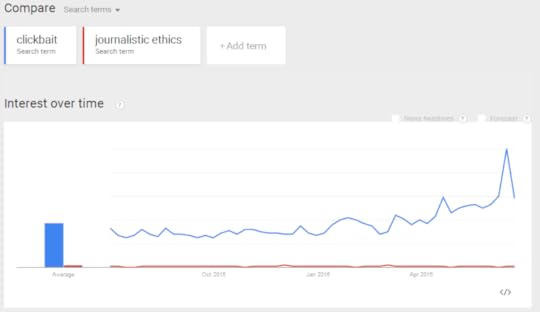No, Britain is not wondering “What is the EU?”
 Send to Kindle
Send to Kindle

There are a bunch of articles around the internet implying that on the day of the EU referendum (link to read if you don’t know what that is), a significant proportion of UK voters were not even sure what the EU is. The articles are very convenient, because I for one love to be shocked at the ignorance of others.
Here’s one article, which is representative of the others I’ve seen: After Brexit Vote, Britain Asks Google: ‘What Is The EU?’
They’re all misleading. This one is particularly disappointing, because it’s from NPR, a news source I mostly trust.
It pretends to be saying something, without actually saying anything. What are the relative numbers? How many people made this search? It’s a 400% increase, but how many people is that? Nobody knows.
It says there’s a 680% increase in people from London wanting to move to Gibralter, but are we really expected to believe that there are enormous masses of people suddenly going to move from the financial center of the world to a barren island less than 7 square kilometers where the primary economic driver is people coming to look at a big rock? In reality, it’s more like last week there was 1 person who wanted to move there, this week there are around 7 people. But “less people than you can see if you look out your window during the day want to move to Gibralter” is a boring headline. It’s a bit long too, let’s just make it “BRITAIN MOVES TO BIG ROCK.”

And it’s not even as big as this monkey.
Who are the people making these searches? Nobody knows. More importantly, news sites don’t care. They could be among the 14 million registered voters who didn’t vote, because they realized they didn’t know enough about it, didn’t really care, or were too busy searching things on the internet. They could also be among the 4 million immigrants who can’t vote, or the hundreds of thousands of tourists wondering what all the fuss is about. And then they could be among the 12 million minors who also can’t vote but might still take an interest in the issue and therefore search “What is the EU?”
Google Trends is just a toy, not something that should be used as the sole source for a news story. It’s very easy to misuse and misunderstand, like so:

Uncle Karl, is that you?
Going by that, people in the UK didn’t even know what the UK was on referendum day, and since we can see back for a year, they’ve never known! Nothing to do with the referendum at all – it’s just an enormous steady stream of people having no idea where they live. According to this, more people seem to know what the EU is than what the UK is. Even on the day of the referendum, there were still more people wondering what country they lived in than what international body they were a part of.
The article makes a half-sentence reference to the fact that the search for “what is the EU” was dwarfed by searches for “referendum results”, but dwarfed by how much? It doesn’t say, so I had to look for the facts myself. Oh, no big deal, looks like it’s only dwarfed by more than 10,000%, so much so that the line for “what is the EU” looks like the EKG reading for a day-old corpse.

Apparently only my great-great-grandfather – who died of congestive heart failure 70 years ago – is unsure what the EU is.
That’s a lot of people, right? With a little playing around, I was able to find something that people were even more interested in than the EU referendum results.

How can you think of sex at a time like this?
Since that’s about 230% of the EU referendum results search, and we’ve now got a good idea that there is a ridiculous amount of people living in the UK by searching more than just a few intentionally misleading terms, we can then conclude that, at worst, no more than .003% of UK voters (or 1 out of every 33,000 people) is unsure of what the EU and the UK are. The real answer is, in fact, much much lower than that because this doesn’t take into account such people as those who don’t use google, don’t use computers, or simply search using different terms. but I’m not a mathematician or statistician*, so I’m not going to pretend to be one, unlike the various news outlets “reporting” this and pretending to be journalists.
Somebody remind me how following the news is somehow supposed to keep you well-informed. Without it, at least we wouldn’t have our heads constantly filled with BS like this.
___________________________________________________________
*I’m really not! All numbers here are roughly precise.



